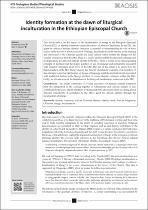| dc.contributor.author | Kama, Phumezile | |
| dc.contributor.author | Klaasen, John S. | |
| dc.date.accessioned | 2023-04-20T12:50:48Z | |
| dc.date.available | 2023-04-20T12:50:48Z | |
| dc.date.issued | 2023 | |
| dc.identifier.citation | Kama, P., & Klaasen, J. S. (2023). Identity formation at the dawn of liturgical inculturation in the Ethiopian Episcopal Church. HTS Teologiese Studies/Theological Studies, 79(1), a7992. https://doi.org/10.4102/hts.v79i1.7992 | en_US |
| dc.identifier.issn | 2072-8050 | |
| dc.identifier.uri | https://doi.org/10.4102/hts.v79i1.7992 | |
| dc.identifier.uri | http://hdl.handle.net/10566/8846 | |
| dc.description.abstract | This article reflects on the impact of the inculturation of liturgy in the Ethiopian Episcopal
Church (EEC) on identity formation within the context of African Christianity. In the EEC, the
quest for African Christian identity formation is essential in understanding the role of black
culture at the advent of the inculturation of liturgy. Inculturation can be viewed as the meeting
and interaction of the Christian gospel and local cultures where neither the liturgy nor the
cultures are superior than the other. Thus, it is vital to understand the inculturation of liturgy and
its implications for African Christian identity in the EEC. There is a need for an official guiding
principle or doctrinal and theological position on use of language and instruments associated
with ancestor veneration at all levels of the EEC. | en_US |
| dc.language.iso | en | en_US |
| dc.publisher | AOSIS | en_US |
| dc.subject | Identity | en_US |
| dc.subject | Religion | en_US |
| dc.subject | African | en_US |
| dc.subject | Culture | en_US |
| dc.subject | Ethiopia | en_US |
| dc.title | Identity formation at the dawn of liturgical inculturation in the Ethiopian Episcopal Church | en_US |
| dc.type | Article | en_US |

